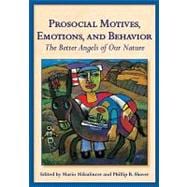
Note: Supplemental materials are not guaranteed with Rental or Used book purchases.
Purchase Benefits
Looking to rent a book? Rent Prosocial Motives, Emotions, and Behavior The Better Angels of Our Nature [ISBN: 9781433805462] for the semester, quarter, and short term or search our site for other textbooks by Mikulincer, Mario; Shaver, Phillip R.. Renting a textbook can save you up to 90% from the cost of buying.
| Contributors | p. ix |
| Preface | p. xiii |
| Introduction | p. 3 |
| Theoretical Perspectives | p. 13 |
| Empathy-Induced Altruistic Motivation | p. 15 |
| Evolutionary Perspectives on Prosocial Behavior | p. 35 |
| Enduring Goodness: A Person-by-Situation Perspective on Prosocial Behavior | p. 55 |
| A Behavioral-Systems Perspective on Prosocial Behavior | p. 73 |
| Forms of Concern: A Psychoanalytic Perspective | p. 93 |
| Neuroscience Meets Social Psychology: An Integrative Approach to Human Empathy and Prosocial Behavior | p. 109 |
| Psychological Processes | p. 127 |
| Empathy-Related Responding: Links With Self-Regulation, Moral Judgment, and Moral Behavior | p. 129 |
| Genetic and Environmental Influences on Prosocial Behavior | p. 149 |
| The Effortful and Energy-Demanding Nature of Prosocial Behavior | p. 169 |
| Helping Relations as Status Relations | p. 181 |
| Compassionate Callousness: A Terror Management Perspective on Prosocial Behavior | p. 201 |
| Basic Values: How They Motivate and Inhibit Prosocial Behavior | p. 221 |
| Prosocial Emotions | p. 243 |
| Compassionate Love as a Prosocial Emotion | p. 245 |
| Does Gratitude Promote Prosocial Behavior? The Moderating Role of Attachment Security | p. 267 |
| The Malleability of Forgiveness | p. 285 |
| The Subjective Experience of Generosity | p. 303 |
| Prosocial Behavior at the Relational Level | p. 325 |
| Prosocial Motivation and Behavior in Close Relationships | p. 327 |
| Forgiveness: Integral to a Science of Close Relationships? | p. 347 |
| Responding to Need in Intimate Relationships: Social Support and Caregiving Processes in Couples | p. 367 |
| Prosocial Behavior at the Group and Societal Levels | p. 391 |
| Empathy and Intergroup Relations | p. 393 |
| A Needs-Based Model of Reconciliation: Perpetrators Need Acceptance and Victims Need Empowerment to Reconcile | p. 409 |
| Overcoming Psychological Barriers to Peacemaking: The Influence of Beliefs About Losses | p. 431 |
| Index | p. 449 |
| About the Editors | p. 467 |
| Table of Contents provided by Ingram. All Rights Reserved. |
The New copy of this book will include any supplemental materials advertised. Please check the title of the book to determine if it should include any access cards, study guides, lab manuals, CDs, etc.
The Used, Rental and eBook copies of this book are not guaranteed to include any supplemental materials. Typically, only the book itself is included. This is true even if the title states it includes any access cards, study guides, lab manuals, CDs, etc.